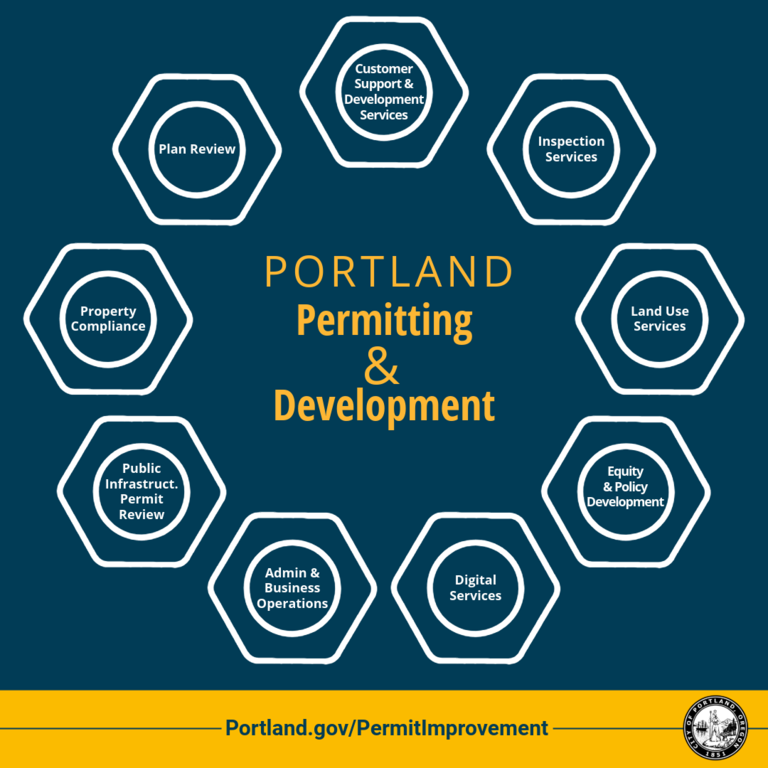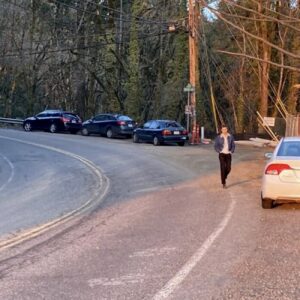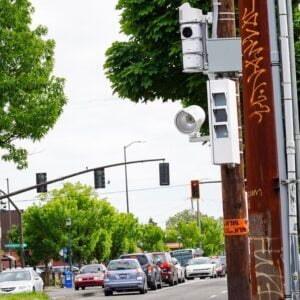
This is going to be another wonky post about development and transportation. If you aren’t interested in development, or if you live in a Portland neighborhood that benefits from a lot of capital projects — public money — you probably don’t have to slog through all this, it’s not of immediate concern to you.
Everybody else, Portland is poised to get a new bureau!
With the proposed creation of Portland Permitting & Development, the city has reached an important milestone in the intense reorganization underway to prepare for our new form of government. This new bureau also marks a significant shift for the Portland Bureau of Transportation. Once the change is adopted by City Council late next month, PBOT will no longer oversee the transportation piece of the development review process.
It’s all a part of what City of Portland Chief Administrative Officer Michael Jordan says is how the city is, “Committed to common-sense improvements that make our government effective and efficient.”
the transportation piece of the development review process is being moved out of PBOT and into PP&D [Permitting and Development]. And that’s a big deal.
The new structure
The new bureau will have about 350 employees, many of them from the Bureau of Development Services, which will become a legacy bureau set for phase-out. One new structural change, however, is that PP&D will also house work groups from the Parks & Recreation, Transportation, Water and Environmental Services bureaus in its Public Infrastructure section.
This reorganization seem to be in response to a damning 2021 audit of the building permit process which concluded that “An essential function of Portland’s building permits system does not work as it should.”
One noteworthy thing about the 2021 audit was that it singled out Portland’s antiquated Commissioner form of government as part of the problem:
Portland’s fragmented form of government exacerbates the situation. Seven bureaus and City Council are responsible for plan reviews, but no one entity manages systemwide performance. The bureaus have important improvement projects underway that were progressing slowly even before the pandemic. Meanwhile, the more difficult work to address persistent concerns about Portland’s complex regulatory environment has stalled altogether.
That same year, Commissioners Dan Ryan and Mingus Mapps began the work of streamlining permitting by appointing a large Permit Improvement Task Force comprised of civil servants from the permitting bureaus (Transportation, BES, Parks, Fire, Forestry, Water). The new PP&D bureau appears to be the result of all that behind-the-scenes effort.
Regulatory reform
Unlike with the internal structural reform, BikePortland has been closely covering this year’s public-facing push toward housing regulatory reform, beginning with Commissioner Carmen Rubio’s survey of development stakeholders, continuing with the proposed code changes to bike parking requirements, and landing with the Planning Commission’s vote to recommend the Housing Regulatory Relief Project to the Portland City Council.
(Yep, all that happened in just one year.)
What it means for a BikePortland reader
The structure of the new bureau appears to address many of the issues about inefficiency raised in both the 2021 audit and the 2023 development stakeholder survey. But what does this insider baseball mean for a BikePortland reader?
Well, let’s start with me. For three and a half years, I’ve been trying to explain to BikePortland readers that not every bit of road work is a capital project. Yes, the Portland Bureau of Transportation (PBOT) has a Planning section with lots of project managers, and they do community outreach, surveys, meetings, and eventually big ticket changes like on Division Street, or 82nd Avenue get built.
But PBOT also has a development review section which oversees changes to the right-of-way triggered by new construction, and for which developers foot the bill. My stories about the new apartment building on Gibbs St (which went in without a curbed sidewalk), or the proposal for the Alpenrose site — and whether a sidewalk and bike lane on Shattuck will be part of it it — have all been about decisions made in the development review process. Got it?
What is happening with the current restructuring is that the transportation piece of the development review process is being moved out of PBOT and into PP&D. And that’s a big deal. It affects things like having a place to park your bike, a lane to ride in, and whether your neighborhood has sidewalks or not. Like it or not, development review is where a lot of decisions about the right-of-way are made.
It’s a good change, not the least because there is a chasm between the cultures of Planning and that of Development Review. An event organized by a Planning team will have a friendly slide show, maybe some refreshments, “and here’s some crayons for the kids.” Conversation tends to be aspirational.
At a development review meeting, people sometimes show up with lawyers. Conversation is about legal requirements, and the cost of frontage improvements. And what the public sector can fairly exact from private owners. So moving the activities of transportation development review away from PBOT and into the new bureau distinguishes between the two funding sources (public and private) and relieves PBOT of overseeing development review activities which I often felt the rest of the organization did not know much about.
After May 22nd, when the City Council votes on the proposed reorganization, I will no longer have to write “the development review section of the Portland Bureau of Transportation.” PP&D will do just fine.








Thanks for reading.
BikePortland has served this community with independent community journalism since 2005. We rely on subscriptions from readers like you to survive. Your financial support is vital in keeping this valuable resource alive and well.
Please subscribe today to strengthen and expand our work.
Thanks Lisa. I’m one of a few people who pays attention to your pieces about development and the processes involved. If I’m not mistaken, the Bureau of Development Services is the only bureau in the city that is self funded. All their funding comes from the costs developers pay for issuing permits. They don’t exactly have the city’s best interests in mind when collecting this money and in fact they probably prefer it that way. I agree there is way more red tape that developers have to go through to get permits, so I hope this new bureau helps developers. I also hope when new development takes place they take the piece of the puzzle that is missing most of the time. Active transportation accommodation. We are supposed to be giving people alternatives to driving when new development occurs, but for the last 30 years that hasn’t seemed to be a consideration.
Oh, thank you Curly. Thank you. At least two of us are a little nuts.
My name is qqq and I also read all those articles.
LOL, I appreciate the opportunity to laugh. I’m sitting here sick, kind of wiped out, not enough energy to write anything.
Yes, it is very sad that they are self funded, so they have to charge ridiculous fees for permits. One has to wonder what one pays for.
For example, couple years ago had electrical work done. City inspector comes and spends more time looking at the view from my house than actually looking at the electrical work. I think he was on my property for less than 5 minutes.
Yeah, made me so thankful for his inspection I felt so much safer afterwards. /s
Interesting change, but I’m guessing it affects none of the underlying variables that keep our bike and ped infrastructure in such a rag-tag state?
In other words, the new bureau will ensure that bad development happens faster.
Yeah Fred, I could have continued on, but I try to be sensitive to the fact that people will only read so much on a computer screen.
The piece that is missing is district representation. What I predict/hope will happen is that, with districts, the city will start having to do a better job of tracking, and making public, expenditures by area of town. If you were a commissioner wouldn’t you want to know what is being spent in your district?
Once you do that, I predict it will show that Portland’s policy of sidewalk- and bikelane-building by private owners is not working very well in many areas. So the question becomes, how do you pay for it? SW needs stormwater infrastructure. Without it we aren’t getting sidewalks. So why not go to the state, or the federal government, for funds to build some more treatment ponds? (And no, that is not up to volunteer advocates to do. We have representatives, with paid staff–that should be their job.)
Fred, I have not seen a chart of who will do what, but the rumor mill was that this will be a case of ‘meet the new boss…’ The person who was the big problem as far as ped/bike goes at Development Review was allegedly getting the lead (or close to it) in this new Bureau. In fact, that person once insinuated that their career depended on eliminating infrastructure costs to developers and legal fights over frontages. Guess this is the payoff, if true.
This Bureau will be just as hostile as Development Review was to non-car infrastructure.
That might be the case, but even then, it’s an improvement over the status quo. Right now, there isn’t a good way to reconcile contradictory laws and regulations when the regulators are in different bureaus. It can get quite maddening. At least now someone will (hopefully!) make a call one way or another. If that person isn’t the greatest, then the next step is to find someone better, not keep the status quo.
Putting the person who previously made those calls (and routinely said ‘no’ ) in charge of the new process IS the status quo.
Portland, like all US cities, goes through construction boom and bust cycles. During boom cycles, the combined services makes perfect economic sense, but during long recessions BDS (and now PP&D) goes through huge layoffs of trained staff, so any long-term development review is then taken up by the other bureaus who have less turnover – but now they won’t have trained staff either, so the city’s residents will be even more SOL on the process during bad times.
I’m sure you are right, David, but it doesn’t change the underlying obstacles to public-infrastructure improvement. I’ve lived in places, like California, where private development improves public infrastructure – in boom times as well as bust times. In Oregon the two are decoupled and they need to be re-coupled (or just coupled).
Well any change should be better than it was/is, but I have very low expectation..to the point, we don’t even bother attempting to get a permit ourselves in the city (and a lot of other jurisdiction) because it was such a colossal waste of our time. We started hiring a 3rd party (mainly Faster Permits) to deal with it. And furthermore, a lot of inspection items they would require a Special Inspection, ie we hire a 3rd part to inspect. So we will see
Here is Portland Permitting at its finest :
Replacing some mechanical equipment on a rooftop on an existing commercial building, that it……and ..Urban Forestry rears its head, they need a site plan, showing trees and sizes, and apparently there is a dead tree (so they sent someone there to look at the site?)……so guess what, they want it removed and replaced + some other site work..what a joke..if this is so important to the Urban Forestry..why not send these issues and requirements to the site owner, like they somehow don’t know who/where they are..Portland permitting…what a bunch of nuts there…
Thanks, Lisa, very informative. When we built our house on a vacant lot the city required an off-street parking space. But there had never been a curb cut before, so installing one for off-street parking removed a space from the street, for no net gain. In order to remove the parking requirement we had to pay $1500 and write to all the neighbors, then wait for their comments, of which there were none. No one at the city was willing to say this policy made no sense. Will that change, I wonder?
That requirement for off-street parking in low density residential zones went away in 2021 as part of the Residential Infill Project. So, that particular problem would no longer occur.
With that said, the new Permitting & Development agency will still be responsible for enforcing a zoning code written by the Bureau of Planning & Sustainability. Individual bureaucrats won’t have the ability the waive code requirements, even when they happen to disagree with them.
It also appears that when the parking requirement was removed, PBOT lost the will to remove on-street parking for bike lanes.
I remember that coming up with (as I recall) the NE 33rd bike lane installation-then-removal. Didn’t the fourplex developer say, “We built our project without off-street parking, like zoning encourages, then after we built it you took away our on-street parking. Thanks a lot!” or something along those lines. It seemed like a legitimate reason to be unhappy–and another example of why different bureaus need to coordinate.
In theory, this should work a lot better. Obtaining a Public Works Permit for required street improvements takes close to a year and can hold up the building permit. You can complain to BDS all you want, but they would tell you they can’t do anything about it because it’s a different bureau managing that permit. As with anything city of Portland, I won’t hold my breath. We’ll see if this change is implemented effectively.